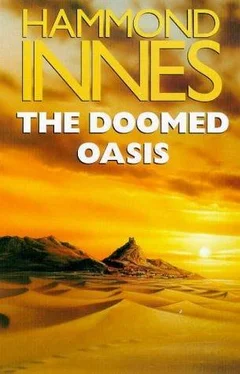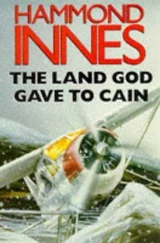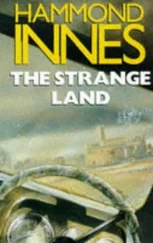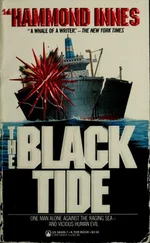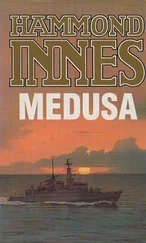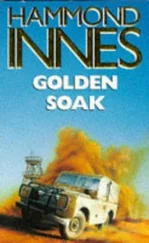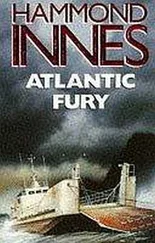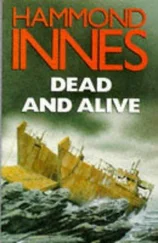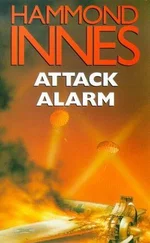Hammond Innes - The Doomed Oasis
Здесь есть возможность читать онлайн «Hammond Innes - The Doomed Oasis» весь текст электронной книги совершенно бесплатно (целиком полную версию без сокращений). В некоторых случаях можно слушать аудио, скачать через торрент в формате fb2 и присутствует краткое содержание. Жанр: Прочие приключения, на английском языке. Описание произведения, (предисловие) а так же отзывы посетителей доступны на портале библиотеки ЛибКат.
- Название:The Doomed Oasis
- Автор:
- Жанр:
- Год:неизвестен
- ISBN:нет данных
- Рейтинг книги:5 / 5. Голосов: 2
-
Избранное:Добавить в избранное
- Отзывы:
-
Ваша оценка:
- 100
- 1
- 2
- 3
- 4
- 5
The Doomed Oasis: краткое содержание, описание и аннотация
Предлагаем к чтению аннотацию, описание, краткое содержание или предисловие (зависит от того, что написал сам автор книги «The Doomed Oasis»). Если вы не нашли необходимую информацию о книге — напишите в комментариях, мы постараемся отыскать её.
The Doomed Oasis — читать онлайн бесплатно полную книгу (весь текст) целиком
Ниже представлен текст книги, разбитый по страницам. Система сохранения места последней прочитанной страницы, позволяет с удобством читать онлайн бесплатно книгу «The Doomed Oasis», без необходимости каждый раз заново искать на чём Вы остановились. Поставьте закладку, и сможете в любой момент перейти на страницу, на которой закончили чтение.
Интервал:
Закладка:
He felt abandoned then, more alone than he’d ever been in his life before. But it was a mood that didn’t last, for in less than an hour the haze thinned and away to port the vague outline of a mass of mountains emerged. A few minutes later and the sky was clear, a blue bowl reflected in the sea, and the mountains stood out magnificent, tumbling down from the sky in sheer red cliffs to disappear in a mirage effect at the water’s edge. Ahead, a long dhow stood with limp sail suspended in the air, and beyond it the world seemed to vanish — no mountains, nothing, only the endless sky. For the first time he understood why men talked of the desert as a sea.
Twice the sambuq’s aged engine petered out. Each time it was the boy who got it going. The naukhuda sat dreamily at the helm, steering with the toes of his right foot curled round the smooth wood of the rudder bar. A charcoal fire had been burning on the low poop ever since he’d come on board and the big cooking pot above it eventually produced a mess of rice and mutton which they ate in their fingers. A small wind stirred the surface of the sea, increased until it filled the sail and the engine was switched off. In the sudden quiet, the sound of the water sliding past the hull seemed almost loud. The mainsheet was eased out and the sambuq took wing. ‘Ras al-Khaima.’ The naukhuda pointed across the port bow. At the very foot of the mountains and low on the horizon, he made out the dun-coloured shape of houses, the tufts of palms. And shortly after that the coast ahead showed up, low and flat, a shimmering line of dunes.
The sun was barely halfway up the sky when they closed that dune coast. A line of camels marched sedately along the sand of the foreshore and close under the low cliffs a Land-Rover stood parked, a lone figure in Arab clothes standing beside it. He thought then that this was his father and braced himself for that first meeting, wondering what he would be like. But when the naukhuda paddled him ashore in the sambuq’s dugout, it was an Arab who waded into the shallow water to meet them.
Again the difficulty of trying to make himself understood. The Arab’s name was Yousif and he spoke a little English. ‘Coll-onell Sahib not here. You come Saraifa now.’ The word Saraifa was shouted at him several times as ‘ though he were deaf.
‘How far is Saraifa?’ The man stared at him as though he were mad. He was a very dirty-looking individual, his greasy turban trailing one end over his shoulders, a torn and very filthy European jacket worn over his Arab robes. His dark face was smudged with oil; this and the little black moustache below the curved nose gave him a sinister appearance. David tried again: ‘Saraifa … ten miles, twenty?’ He held up his fingers.
‘Saraifa no far in machine of Coll-onell Sahib.’ The gap-toothed smile was clearly meant to placate. ‘Me driver to Coll-onell Sahib. Drive very quick.’ That seemed to exhaust his fund of English, for he turned to the naukhuda and launched into a guttural flood of conversation. At length the naukhuda stepped forward, kissed his hand and touched it to his heart with a little bow. David gave him one of the notes the Mate had handed him and found his hand held in the other’s horny palm whilst the old man made him a long farewell speech.
Then at last he was in the Land-Rover and they were roaring along the sand of the foreshore, the driver bent over the wheel like a rider urging on his horse, with the stray end of his filthy turban streaming out behind him. A mile or two further on they left the sea’s edge by a camel track that climbed the shallow cliffs. Looking back, David got a last glimpse of the dhow that had brought him to the Arabian shore, and then they were bouncing past the Bedouin caravan he had seen moving along the sands. The camels stared with supercilious gaze, padding effortlessly through the sand under their mountainous loads. The men, wild and bearded, raised their hands unsmilingly in desert salutation. The silver mountings of their old-fashioned guns winked in the hot sun, and David caught the wicked gleam of khanjar knives and the brass of cartridge belts. He was seeing for the first time the desert world that was to be his home.
2. Enquiries of an Executor
The account of his actual arrival in Arabia was contained in the letter he dispatched to me almost immediately after he had reached Saraifa. For that reason, I suppose, it told me little about the actual meeting between himself and his father. Scribbled in pencil on scraps of paper, it had been written mostly on board the Emerald Isle. Except for the final page it had been completed at a water-hole somewhere in the desert where he and Yousif had spent the night. The final page was nothing more than a hastily-written postscript: Saraifa at last, but I arrived at a bad time — my father was with the Sheikh and an oil director and his pilot, and he leaves with them in the morning for Bahrain. He seemed angry at first, but it’s all right now, I think. The Sheikh’s son, Khalid, is to look after me whilst he is away and I am to go on a hunting expedition with him to get to know desert ways. My father is a great man here with a bodyguard and a mud fort or palace where I am writing now. He has only one eye and a black patch over the other, which makes him a bit terrifying at first and everybody seems afraid of him. Men keep coming into this room for one reason and another, but really to stare at me. It is all very strange — but exciting. Thank you again. David. At the end of the year he sent me a Christmas Card. It was a Gulfoman Oilfields Development Company card and was postmarked Basra. He was at an oil school studying geology and seemed happy. That was the last I heard of him until I received the news, three years later, that he was missing in the Rub al Khali desert, the Empty Quarter.
By then I was involved in his father’s affairs. It was a strange business and one that was causing me considerable concern — though at the outset it had seemed straightforward enough. In fact, I wasn’t in the least surprised when he asked me to act for him. A lawyer’s business is a very personal one and tends to grow through personal contact. What my son has told me about you, and the fact that your firm acted for me for many years in the matter of the settlement to his mother, leads me to place complete confidence in your discretion and in your ability to use your own initiative when required. He wanted to consolidate his financial affairs, he said, and he sent me Power of Attorney and gave me authority to collect all monies, meet any accounts that became due and generally manage his business interests. There was nothing particularly unusual about this, except that I was on no account to attempt to communicate with him in any way once the arrangement was working.
My correspondence with him lasted over several months. His letters were all hand-written and the only address he gave was his bank in Bahrain. Shortly after it was all agreed, money began to flow in from all over the Middle East, from Arab merchants and bankers, from traders, from a firm of stockbrokers in Cairo and a large sum from the cashier of the London Office of the Gulfoman Oilfields Development Company. This went on for about a year. Some of it was in kind — pearls from a dealer in Bahrain, even a box full of Maria Theresa dollars and another full of silver, presumably gifts from the local sheikhs.
Finally the flow had dried up and, presuming that the operation was against his retirement, I invested the money for him, mostly in local industry of which I had personal knowledge. The market, of course, was a restricted one, but it never occurred to me that he would almost immediately want large sums in cash. And then in May of the following year accounts began to come through for settlement — for stores, equipment, vehicles; the largest single item almost £5000 for a second-hand seismological truck, complete with geophones and all the necessary equipment for a geophysical survey, and there had been a shipping agent’s account for freighting it down from Basra to Muscat on the Emerald Isle. It was clear that he was embarking on a programme of oil exploration on his own, expecting it to be financed by the nominee account, and it worried me, for I’d no means of knowing where it was going to end. I ignored my instructions then and wrote him several times, care of his bank, but received no reply. And in the New Year I received another batch of accounts, this time for fuel and stores and drilling pipe. I was by then thoroughly alarmed about the whole situation. He obviously didn’t realize that there were restrictions on bank lending in force and I was reluctant to sell securities on a weak market. I was able to meet the immediate accounts, but I had to know what his future plans were. On March 5 I received an account for the hire of a complete drilling rig. I phoned an oilman I knew in Milford Haven, and he gave me figures for the probable cost of drilling, even with a hired rig, that staggered me. I wrote to Whitaker then stating that unless he sent me a statement of his plans and the probable cost by return, I should have no alternative but to fly out at his expense to discuss the whole situation.
Читать дальшеИнтервал:
Закладка:
Похожие книги на «The Doomed Oasis»
Представляем Вашему вниманию похожие книги на «The Doomed Oasis» списком для выбора. Мы отобрали схожую по названию и смыслу литературу в надежде предоставить читателям больше вариантов отыскать новые, интересные, ещё непрочитанные произведения.
Обсуждение, отзывы о книге «The Doomed Oasis» и просто собственные мнения читателей. Оставьте ваши комментарии, напишите, что Вы думаете о произведении, его смысле или главных героях. Укажите что конкретно понравилось, а что нет, и почему Вы так считаете.
